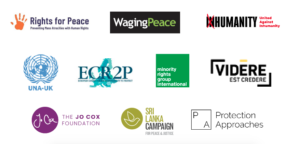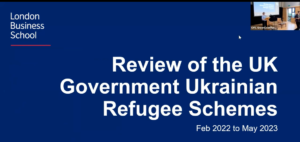Dr Lul Seyoum is a Vice-Chair of UAI in the UK as well as a Director of ICERAS (the International Centre for Eritrean Refugees and Asylum Seekers)
The following is a transcript of the response made, at the 2021 AGM of UAI in the UK, to the keynote presentation by Dr Jeff Crisp
Jeff, I’d like to take this occasion to thank you for your constant commitment to advocate for refugee rights. It’s change-makers like you (who stand up to power) that make a difference in the lives of the vulnerable community of asylum seekers and refugees.
On European asylum policies, all I can say is that European member states are regretfully engaged in raising their border fences instead of elevating their moral leadership. Sadly, so many lives out there are lost while trying to reach a safe space.
In September 2020, the world recognized the 75th anniversary of the United Nations and its founding Charter. In July 2021, we will recognize the 70th anniversary of the Refugee Convention, created to ensure that the rights of refugees are respected and protected.
The UK takes pride in its heritage of welcoming refugees over the last 70 years and some of us here have benefited from this. Now, as a result of the current government activities, we find that this tradition is being eroded.
We hear of a “New Plan for Immigration” which says that asylum seekers who enter the UK via routes deemed illegal will be removed. We are witnessing the Home Office proposal to send asylum seekers abroad while their claims are pending.
We hear that the Danish Parliament voted in favour of a proposal to process asylum seekers outside Europe by setting up a refugee screening centres in third countries. Although no deals with third countries have yet been signed, the Danish Government has agreed a Memorandum of Understanding with Rwanda and is in contact with Tunisia, Ethiopia and Egypt.
This plan drew strong criticism from the UN, the European Commission and human rights groups, who said that it lacked guarantees on human rights and would undermine international cooperation. It is this Danish ‘offshoring policy’ that the UK Home Office is seeking to emulate. One suggestion of the location seems to be Ascension Island, more than 4,000 miles from the UK.
I’d like to share what happened, in 2014, when the Danish Immigration Service appointed two researchers to carry out a fact-finding mission on Eritrea titled “Eritrea – Drivers and Root Causes of Emigration, National Service and the Possibility of Return. Country of Origin Information for Use in the Asylum Determination Process”. The Danish report documented that Eritrean refugees could safely return home with no consequent repercussions by the Eritrean authorities.
In 2015, in the UK, the number of Eritrean Refugees was higher than even the number of Syrians. The Home Office quickly adopted the Danish report to determine the decision on rejecting the Eritreans’ applications for asylum, knowing that this was at odds with the findings of the UN Commission of Inquiry on Human Rights in Eritrea, which had said that the severe human rights violations carried out by the government may constitute crimes against humanity and that Eritreans who fled the country illegally were regarded as “traitors” and, when they returned, were usually detained in harsh conditions.
The Home Office rejected suggestions from NGOs, academics, media outlets and others to avoid using this report in determining the decision to reject applications from Eritrean asylum seekers.
Later, the two Danish researchers resigned because they believed that the final document produced by the Danish Immigration Service misrepresented them. As a consequence of this, the UK Home Office was forced to take the document off their site and, most importantly, to reverse the rejected Eritrean applications.
The advice and advocacy against using the findings in the report by Danish NGOs, including the Danish Refugee Council, Amnesty International, various civil society organisations, campaign individuals and groups, academics, as well as media outlets, had its impact.
Based on this, my suggestion would be to remove ourselves from the lack of moral leadership that UK authorities continue to display on this issue. We should engage in expressing our concerns and urge the government to “refrain from externalising its asylum obligations”.
The last event I would quickly want to share is the deal between Italian and Libyan authorities to prevent migrants/asylum seekers from reaching the European soil. In February 2020, the Italian authorities’ 2017 controversial agreement governing migrants crossing the Mediterranean Sea was renewed for a further 3 years.
What happens on the ground is that the migrants, or their smugglers, negotiate with the coast guards to turn a blind eye when they leave. Once the migrants are on the sea, they are returned by the orders of the same guards. These are guards who benefit from the salary and training funded by the Italian authorities.
One may ask if the Italian authorities are taking the smugglers out of business or helping them to flourish?
30 June 2021










